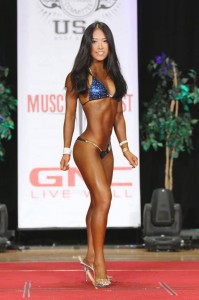College is the stage where students start becoming more fitness conscious, as they gain access to campus gyms. The Bruin Fitness Center and John Wooden Center are often inundated with students working out to achieve their fitness goals. Many students work out to stay fit, but there is also a fraction of the student body committed to bodybuilding.
Will Cho, a second-year business economics student, first started bodybuilding in his junior year of high school. According to Cho, the benefits of bodybuilding are similar to any other sport, like reducing the risk of chronic illnesses and increasing one’s basal metabolic rate.
Here’s a look at the bodybuilding community at UCLA.
The benefits of bodybuilding
Muscles expend energy more quickly than fat, so increasing muscle mass through bodybuilding increases one’s resting metabolism, as bodybuilding is centered around resistance training. This is beneficial for long-term gradual fat loss. An added bonus is that people can consume more food while still maintaining a healthy body. With the amounts of food available at our dining halls, increased muscle mass can help avoid the dreaded freshman 15.
In addition to fat loss, research demonstrates weight training helps preserve muscle mass and bone density that deteriorate with age. Frequent and consistent weight training reduces one’s risk of contracting aging-related diseases such as osteoporosis, arthritis and heart disease. Students who start weight training early on are already ahead of the game in forestalling potential health problems in the future.
Lastly, working out reduces stress hormones such as cortisol, and it releases endorphins that make people feel relaxed once they finish their grueling workouts.
Female bodybuilding

People’s perceptions of bodybuilding are usually of a rugged man with bulging biceps and chiseled abs like Arnold Schwarzenegger. However, female bodybuilders are challenging gender stereotypes through their growing involvement in the sport, despite not receiving as much recognition or prestige as men.
Fourth-year economics student Candace Kim said she believes there is a stigma surrounding female bodybuilding because of the misconception that weight training makes women bulky and manly.
Kim first started bodybuilding in 12th grade after an injury forced her give up basketball and cross country. Kim has since come a long way in her bodybuilding career, recently participating in the Orange County Muscle Classic in August. She said she loves the sport because it makes her feel healthier and it helps her to relieve stress from school.
Challenges of bodybuilding
Bodybuilding may seem like a glamorous sport to an outsider. However, that may be because the internal struggles that bodybuilders face in the pursuit of sculpting their desired bodies are often hidden.
Going to the gym every day is certainly a huge commitment, but that is only one part of the equation. Bodybuilders need to manipulate their caloric and macronutrient intake to accommodate their training goals.
“Bodybuilding isn’t bodybuilding without food,” Cho said. Bodybuilders have to go on strict diets when trying to “bulk” or “cut,” honing a lot of self-control and discipline in the process.
Kim said when she was training for her competition earlier this year, she would wake up at 5 a.m. every day and start her workout at 6 a.m. She also adopted a strict diet with very specific meal times, consisting of mostly whole and unprocessed food.
Besides sacrificing certain types of food, Kim had to sacrifice hanging out with some of her friends after she became serious with the sport. For serious bodybuilders, hanging out with friends can lead to unhealthy habits like eating out and drinking alcohol on a regular basis, which impedes their ability to gain muscle and lose fat.
Because of its emphasis on crafting a perfect physique, bodybuilding can also lead to body image issues. Kim said she believes that everyone gets judged no matter what. On one hand, female bodybuilders are judged for being too masculine, whereas male bodybuilders are judged for not being lean or muscular enough.
“You should love the way you are now, but be hungry for more,” Cho said.
Kim said her advice to beginners is not to be afraid of what others may think and to do research about bodybuilding so you know what you are getting into.
At the end of the day, no matter how and why you started bodybuilding in the first place, you should do it because it makes you happy. There will always be someone who is better than you, but the key thing is to do it for your own self-fulfillment and not to outshine others.
